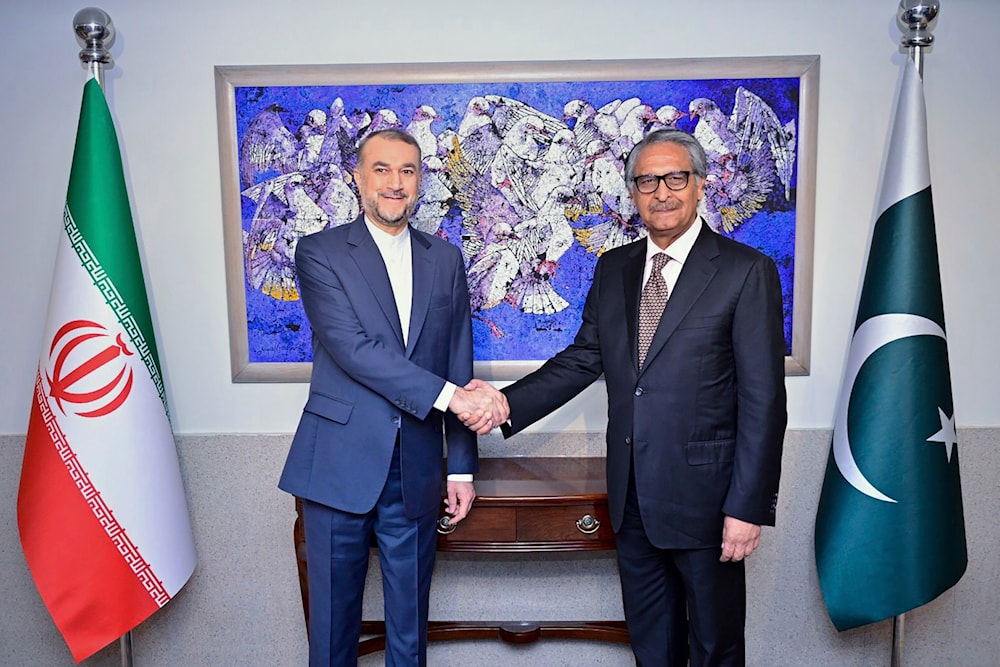Pakistan passes decision to begin works on gas pipeline with Iran
Pakistan’s Geo News reports that the Cabinet Committee on Energy (CCoE) approved to launch works on the first phase of the Iran-Pakistan (IP) gas pipeline, which would increase Pakistan’s energy security.
-

Iran's Foreign Minister Hossein Amir Abdollahian with his Pakistani counterpart, Jalil Abbas Jilani, at the Ministry of Foreign Affairs in Islamabad, Pakistan, Jan. 29, 2024. (AP)
According to Pakistani media outlets, a decision by Pakistan's federal cabinet for an 80-kilometer segment of the pipeline from Gwadar to the Iranian border would allow the country to save over $5 billion a year by buying gas from Iran.
Pakistan’s Geo News reported that the Cabinet Committee on Energy (CCoE) approved the launch of works during the first phase of the Iran-Pakistan (IP) gas pipeline, which would increase Pakistan’s energy security.
The pipeline, which extends from the Iranian borderline to Gwadar port city in Balochistan province, is estimated to cost 45 billion Pakistani rupees while some knowledgeable sources reveal that Pakistan could avoid an $18 billion fine with this project.
Pakistani Senator Mushahid Hussain Syed posted on X: “Caretaker cabinet committee approves work on Iran-Pakistan gas pipeline.”
He added: “About time bold & necessary decisions benefiting the interests of people of Pakistan were taken, the Iran-Pakistan Pipeline is absolutely vital for Pakistan’s Energy Security & Economic Independence!”
Caretaker cabinet committee approves work on Iran-Pakistan gas pipeline https://t.co/zz1LwNDyUA About time bold & necessary decisions benefiting the interests of people of Pakistan were taken, the Iran-Pakistan Pipeline is absolutely vital for Pakistan’s Energy Security &…
— Mushahid Hussain Sayed (@Mushahid) February 24, 2024
In 2013, the US threatened Pakistan with economic sanctions over the Iran-Pakistan gas project, citing concerns about Iran's alleged nuclear program. The project, also known as the "Peace Pipeline," was conceived in 1994 and involved India initially.
Read next: Iran's Sarakhs SEZ facilitates 100,000 MT of Russian LPG to Pakistan
However, due to various challenges, including US pressure and India's shift towards the Turkmenistan-Afghanistan-Pakistan-India (TAPI) pipeline, the IP project faced delays.
This past November, Iranian and Pakistani energy ministers pledged to take effective steps in advancing the Iran-Pakistan (IP) gas project deal.
In a turn of events, just ten days ago, the National Iranian Gas Company (NIGC) revealed that a terrorist attack targeted two major gas transmission pipelines in the southwestern province of Chaharmahal and Bakhtiari, and the southern province of Fars, resulting in a colossal blast and a blazing fire afterward.
Days later, The New York Times reported citing two Western officials and a military strategist associated with Iran's Islamic Revolution Guard Corps (IRGC), that Israeli occupation forces launched the attacks, disrupting the supply of heat and cooking gas to Iranian provinces with millions of residents.
⚡BREAKING:
— Megatron (@Megatron_ron) February 13, 2024
🇮🇷 Huge explosion of a gas pipeline between the cities of Shahrekord and Borujen in Iran
The explosion and its aftermath are so large that they could be seen from a distance as far away as 60km.
@Middle_East_Spectator pic.twitter.com/MlhpXmVnfG

 2 Min Read
2 Min Read










